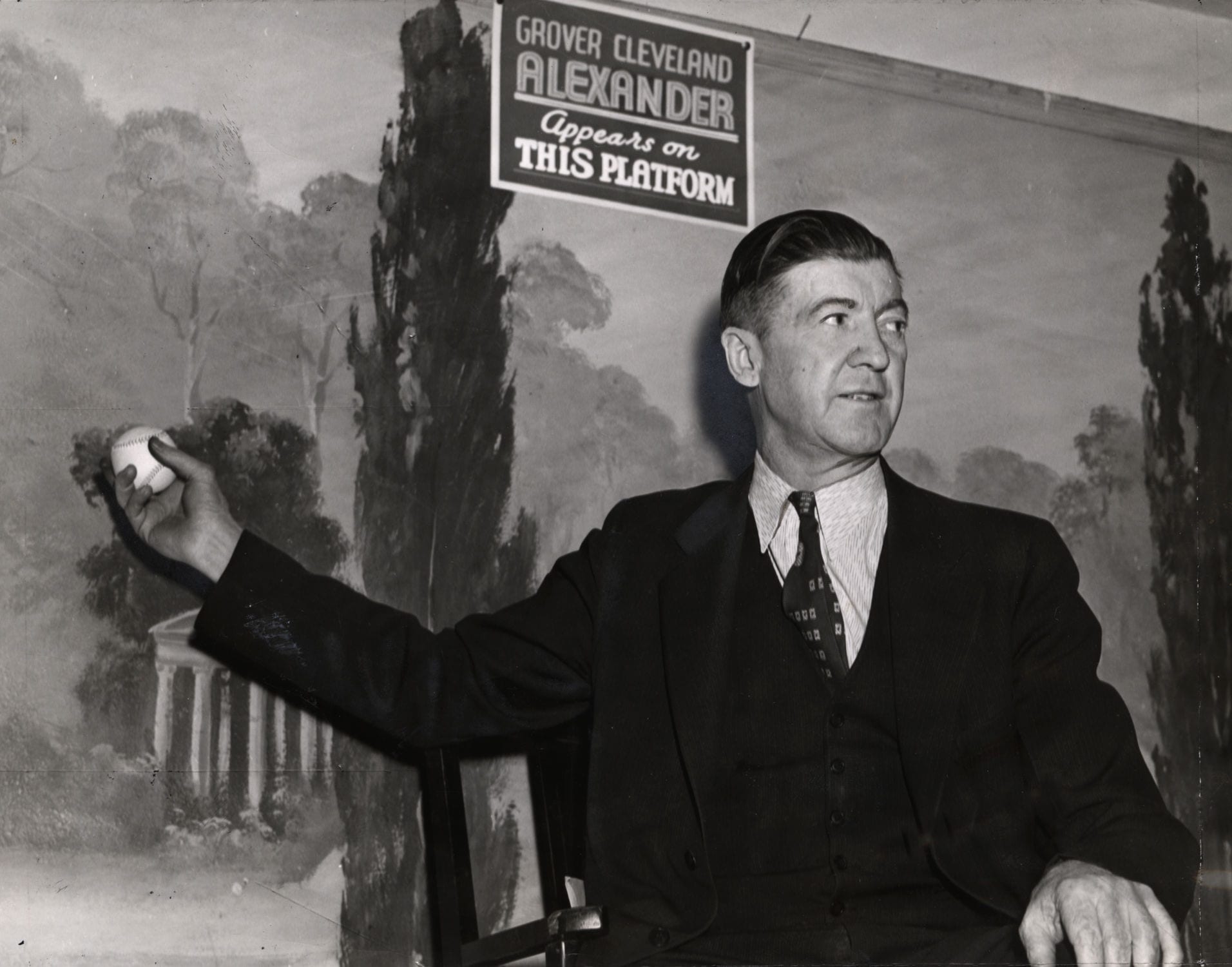
On Veteran’s Day, Remembering War Hero and Hall of Fame Pitcher ‘Old Pete’
By Joe Guzzardi
World War I hero and one of baseball’s best-ever pitchers, Grover Cleveland Alexander led a bittersweet life.
Alexander won the pitching triple crown three times – wins, ERA, and strikeouts – and won 30 or more games three times in three consecutive years, feats that in this five-inning starts era will never be matched. And in the 1926 World Series, Alexander’s performance almost single-handily won the title for the St. Louis Cardinals.
But the Great War left Alexander shell-shocked, near-deaf, alcoholic, and seizure-prone, conditions that eventually left him destitute.
More commonly referred to in baseball circles as “Old Pete,” the young Alexander grew up in tiny Elba, Nebraska, one of 13 children – just six of whom reached adulthood. Society for American Baseball Research historian and Union College English professor Jan Finkel wrote that Alexander’s cornshucking skills helped him develop a strong right wrist that he used to spin his deadly curveball. Alexander perfected his pinpoint control by throwing stones at clothespins or if the evening supper pot was empty, launching rocks at chickens.
Known around Elba as “Dode,” Alexander’s pitching prowess soon became well-known in the old Illinois-Missouri League. In 1909, Alexander signed with the Class D Galesburg Hornets, and by 1911 he had worked his way up to the Philadelphia Phillies, where he recorded 28 wins, arguably baseball history’s best rookie performance. By 1918, Alexander wore a Chicago Cubs uniform and was off to a fast start.
But the Army drafted Alexander, and by late July, his 89th Division and the 342nd Field Artillery unit was on the front, where he spent seven weeks under non-stop enemy attack.
After rejoining the Cubs in 1919, Alexander slowly worked his way back to become close-to, but not quite, the stellar pitcher he had been before his military service. Alexander’s alcohol dependency, however, troubled Cubs’ senior management, and in 1926 the team dumped the 39-year-old pitcher off to St. Louis, where he would star in the legendary New York Yankees-Cardinals World Series.
Alexander notched wins in games two and six. In the pivotal, seventh game, Old Pete came in from the bullpen in the seventh with the bases loaded and preserved the Cards 3-2 lead. Years later, Ruth wrote that the very sight of Alexander chewing his tobacco, and “pitching baseballs as easy as pitching hay is enough to take the heart out of a fellow.” Alexander’s summed up his pitching philosophy as doing in one pitch what others do in three.
Traded to the Phillies in 1930, Alexander couldn’t maintain his excellence, and after an unsuccessful minor league stint, he retired. A prolonged period of personal decline followed.
Unable to find a coaching job or to overcome his alcohol dependency, Alexander worked odd jobs, performed in flea circuses, lived in flophouses, and was in and out of several sanitariums. Alexander’s downward cycle, which included hocking his World Series ring for meal money, was briefly interrupted by his Hall of Fame induction in 1938.
In his acceptance speech, and with the approving roars of the crowd that knew about his war heroism and subsequent struggles, Pete said that his day at Cooperstown was “a mighty proud moment in my life.” Years later, however, a penniless Alexander admitted that while being in the Hall was an honor, fame didn’t put meat and potatoes on his table.
Alexander’s final years were one physical challenge after another. In 1946, Old Pete suffered a heart attack, and the following year, he developed cancer in his war-injured ear that required amputation. In 1950, alone in a St. Paul hotel room, Alexander died.
Two years later, Warner Brothers released “The Winning Team,” a biographical film that starred future president Ronald Reagan as Alexander and Doris Day as the pitcher’s wife, Aimee.
Alexander’s name and his remarkable pitching performances have faded from the memories of all but the most dedicated Dead Ball Era historians. But on Armistice Day 2020, Sergeant Grover Cleveland “Dode” Alexander along with the other 320,000 Americans wounded or killed during World War I deserves to be honored.
–
Joe Guzzardi is a Society for American Baseball Research and Internet Baseball Writers Association.
Viewpoints and perspectives expressed throughout The Independent are those of the individual contributors. They do not necessarily reflect those held by the staff of The Independent or our advertising sponsors. Your comments, rebuttals, and contributions are welcome in accordance with our Terms of Service. Please be respectful and abide by our Community Rules. If you have privacy concerns you can view our Privacy Policy here. Thank you!
Click here to submit an article, guest opinion piece, or a Letter to the Editor




